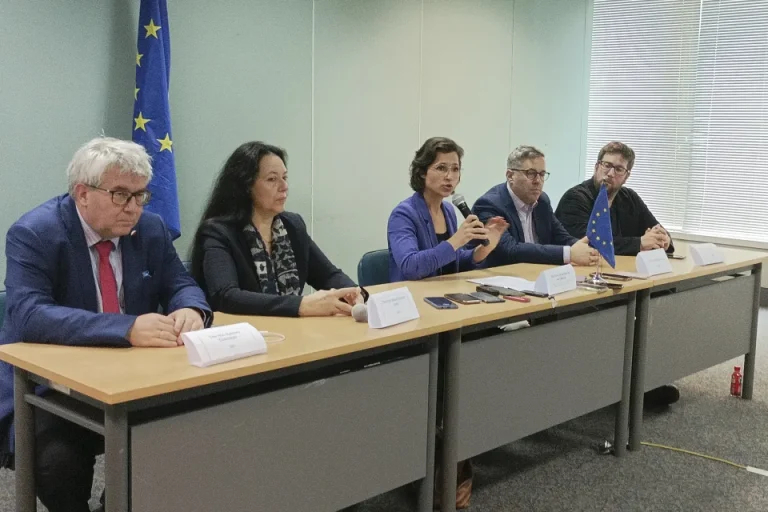
JIM GOMEZ
Fri, February 24, 2023, AP
MANILA, Philippines (AP) — The Philippines’ chances of retaining special trading incentives, including slashed tariffs for a wide array of products, would be boosted if it decides to free a long-detained opposition leader and rejoin the International Criminal Court, a group of European parliamentarians said Friday.
The European Union trade incentives under the so-called Generalized Scheme of Preferences, or GSP Plus, for the Philippines and seven other developing countries are anchored on their adherence to more than two dozen international conventions on human and labor rights, environmental protection and good governance.
The trading incentives, which the Philippines started to enjoy in 2014, would end in December and the government could reapply within a two-year period to retain them, the European lawmakers said.
But the Philippines came under intense EU criticism during former President Rodrigo Duterte’s six-year term, which ended last year, mainly because of the bloody anti-drugs crackdown he oversaw that left more than 6,000 mostly petty suspects dead.
The killings sparked an International Criminal Court investigation as a possible crime against humanity. Duterte withdrew the Philippines from the ICC in 2018 but its prosecutor has proceeded to investigate the widespread deaths that occurred in the years when the country was still part of the court based in The Hague.
European parliamentarians have also repeatedly demanded the release of opposition leader and former senator Leila de Lima, Duterte’s most vocal critic who was arrested and detained in 2017 on drug charges she said were fabricated by Duterte and his officials to stop her from investigating the killings.
A delegation from the European Parliament’s sub-committee on human rights visited the Philippines from Wednesday to Friday and held talks with the justice secretary and other officials, senators, and human rights and labor activists to discuss rights issues under President Ferdinand Marcos Jr., who took office in June.
They visited de Lima on Thursday on the eve of her sixth year in detention and expressed hopes she would at least be released on bail. “I expressed to them my hope and optimism on the prospects of freedom and vindication,” de Lima said in a statement after the visit.
In a news conference in Manila, Hannah Neumann, who led the European delegation, said rights conditions were “better than it was under Pres. Duterte” in reply to a question. “There are a lot of announcements that could indeed improve things if they’re implemented.”
The delegates welcomed in a joint statement Marcos’ “commitment to change the focus of the ‘war on drugs’ away from a punitive approach towards prevention and rehabilitation.”
But they said extrajudicial killings have reportedly persisted and underscored the need for all the killings to be investigated and the perpetrators held to account to fight impunity.
Asked if a decision to release de Lima and rejoin the ICC would boost the Philippines’ chances of continuing to enjoy the EU trading incentives, Neumann said that would be “a strong sign in which direction the country wants to move.”
“The European Parliament has been quite clear that whoever wants to have preferential access to the European market needs to uphold social standards, human rights standards, environmental standards,” she said. “This is not going to go away.”
Out of the more than 6,000 police-reported killings under Duterte’s drug crackdown, she said, only 25 cases have been filed and three law enforcers had been convicted nearly nine months into Marcos’ presidency.
Marcos has also vehemently opposed any future ICC investigations in the Philippines.
“If you look at the trajectory, this will take physically forever,” Neumann said, adding that “asking the ICC to come in is the perfect way to do it.”
European officials wanted to know how they can support such a massive investigation and “how we can make, especially witnesses and families of victims, gain confidence that this is done in a proper way that doesn’t lead to more harassments and intimidation by the very same people that have killed their relatives,” Neumann said.
More than 6,200 products exported by the Philippines are covered by the tax and tariff reduction under the GSP Plus, including crude coconut oil, preserved tuna and pineapple and vacuum cleaners, and more Filipino exporters have sought Europe’s trading incentives in recent years, Philippine trade officials said.